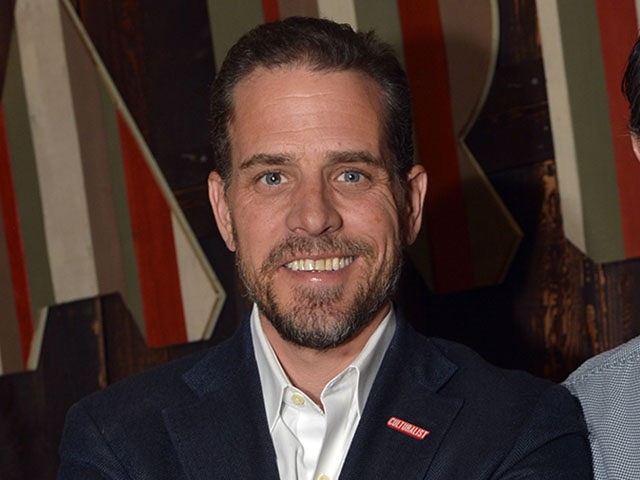The hefty salary that Hunter Biden, former Vice President Joe Biden’s youngest son, drew while serving on the board of directors of a Ukrainian oil and gas giant is raising questions not only about his role with the company, but also if he profited from his father’s political influence.
The younger Biden, who has a history of getting rich from entities tied to his father, is at the center of controversy after President Donald Trump suggested the Ukrainian government look into his business dealings in the country. Although the former vice president has attempted to paint the issue as an abuse of power on Trump’s part, many have noted the unanswered questions surrounding his son’s tenure at Burisma points to serious conflict of interests, if not outright corruption.
The most prominent and perplexing question is how and why Hunter Biden was appointed to the company’s board of directors in the first place. As Peter Schweizer, senior contributor at Breitbart News, detailed in his book, Secret Empires: How the American Political Class Hides Corruption and Enriches Family and Friends, Hunter Biden had no prior experience with either the energy industry or Ukraine before joining Burisma in April 2014. In fact, his background in investment banking, lobbying, and hedge fund management paled in comparison to that of current and past members of the company’s board of directors.
At the time of his appointment, ethics watchdogs highlighted the younger Biden’s lack of qualifications but were more concerned about the appearance of a conflict of interest. In particular, many worried Hunter Biden’s ascension to the board of directors, a position that paid at times more than $83,000 per month, was related to his father’s position as the Obama administration’s point man on Ukraine.
The poor optics not only raised flags among ethics watchdogs, but also with Hunter Biden’s own business partners. Christopher Heinz, the stepson of former Secretary of State John Kerry and co-owner of an investment firm with Hunter Biden in 2014, rushed to play damage control with State Department officials at the time of the appointment, according to internal emails obtained by the Washington Examiner.
Adding to concerns is the fact that at the time Hunter Biden joined Burisma, the company was seen as actively courting western leaders to prevent further scrutiny of its business practices. The same month Hunter Biden was tapped for the group’s board, the government of Great Britain froze accounts belonging to Burisma founder, Mykola Zlochevsky, under suspicion of money laundering. Zlochevsky, a former Ukrainian minister of natural resources, would later be accused of corruption for using his office to approve oil and gas licenses to companies under his control.
Joe Biden’s role in the entire matter has only increased suspicions of conflicting interests. As the sitting vice president, Joe Biden led the Obama administration’s response to the Russian invasion of Crimea in 2014. In that role, he pushed billions of dollars in aid to the Ukrainian government, some of which allegedly was filtered to Burisma.
More troubling, however, is an episode that took place in 2016, when Joe Biden pressured the Ukrainian government to fire Viktor Shokin, the country’s top prosecutor.
Officially, the former vice president has claimed his threat to withhold U.S. aid to Ukraine if Shokin was not fired came from the Obama administration, which had lost confidence in the prosecutor’s abilities to root out corruption.
Unofficially, though, it was well known that Shokin was investigating both Burisma and Zlochevsky for wrongdoing. Regardless of the reason, Shokin’s successor closed the investigation into Burisma and Zlochevsky, allowing the oligarch to return to the country after having fled in 2014.
The appearance of impropriety on the part of the Bidens has also been underscored by the inability of father and son to get their stories straight. Last week the former vice president claimed to never have discussed his son’s business ties with Ukraine during a campaign appearance in Iowa.
“I have never spoken to my son about his overseas business dealings,” Joe Biden angrily said, before pivoting the conversation to Trump’s alleged misuse of power.
The former vice president’s claim, though, directly contradicts his son’s on the topic. The younger Biden admitted during a series of candid interviews for a New Yorker profile published in June that he in fact had discussed his foreign business interests with his father on at least one occasion.
“Dad said, ‘I hope you know what you are doing,’ and I said, ‘I do,’” Hunter Biden told the magazine.
Since making his initial statement in Iowa, Joe Biden has reverted back to his long held position of refusing to discuss his son’s dealings publicly. The silence has left a lot of unanswered questions about Hunter Biden’s role at Burisma.
“Again the question is, what was [Hunter Biden] being paid for?” Schweizer said during a recent appearance on SiriusXM’s Breitbart News Tonight. “These entities were not giving the money away. They were paying Hunter Biden for something. He’s not selling his expertise, so what exactly was he selling? And that’s what needs to be investigated.”
The question is all the more important given Hunter Biden’s history of profiting from his father’s political connections. As Breitbart News reported, the younger Biden scored a job fresh out of law school with his father’s top campaign contributor. In 1996, Hunter Biden was hired for an undisclosed position with MBNA, which at the time was one of the nation’s largest credit card companies.
The job raised eyebrows from good government groups as MBNA employees had just donated $63,000 to Joe Biden’s reelection campaign in what appeared to be a coordinated manner to sidestep federal campaign finance regulations. Hunter Biden would continue working for MBNA in one capacity or another until the mid-2000s, while his father was writing bankruptcy legislation favored by the company.

COMMENTS
Please let us know if you're having issues with commenting.